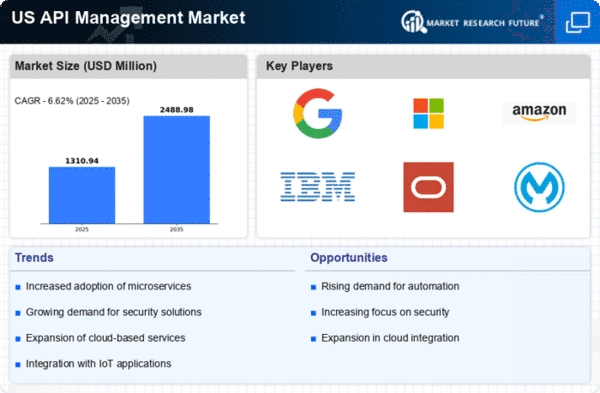Rise of Mobile Applications
The proliferation of mobile applications is significantly influencing the api management market. With mobile app usage expected to reach 7.5 billion by 2026, businesses are increasingly relying on APIs to connect their mobile applications with backend systems. This reliance on APIs is essential for delivering real-time data and enhancing user experiences. As mobile applications become more complex, the need for robust api management solutions becomes apparent. Companies are investing in these solutions to ensure scalability, security, and performance of their mobile applications. The api management market is thus poised for growth as organizations seek to optimize their mobile strategies through effective API integration.
Increased Focus on Data Analytics
The api management market is being propelled by the heightened focus on data analytics among organizations in the US. As businesses generate vast amounts of data, the ability to analyze and derive insights from this data has become crucial. APIs play a vital role in enabling data integration and analytics, allowing organizations to harness the power of their data effectively. The data analytics market is projected to grow to $274 billion by 2022, underscoring the importance of API management in facilitating data-driven decision-making. Consequently, organizations are investing in api management solutions to ensure that their data flows seamlessly across various platforms, thereby enhancing their analytical capabilities.
Regulatory Compliance Requirements
The api management market is also influenced by the increasing regulatory compliance requirements faced by organizations in the US. With regulations such as GDPR and CCPA mandating stricter data protection measures, businesses are compelled to adopt robust api management solutions to ensure compliance. These solutions help organizations manage data access, monitor API usage, and enforce security policies effectively. As compliance becomes a critical concern, the api management market is likely to see heightened demand for solutions that can assist organizations in navigating the complexities of regulatory requirements while maintaining operational efficiency.
Emergence of Microservices Architecture
The shift towards microservices architecture is reshaping the api management market. This architectural style allows organizations to develop applications as a collection of loosely coupled services, which can be independently deployed and scaled. As more companies adopt microservices, the demand for effective api management solutions is likely to increase. These solutions provide the necessary tools for managing the complexities associated with microservices, such as service discovery, load balancing, and security. The trend towards microservices is expected to drive growth in the api management market as organizations seek to enhance their agility and responsiveness to market changes.
Growing Demand for Digital Transformation
The api management market is experiencing a surge in demand driven by the ongoing digital transformation across various sectors in the US. Organizations are increasingly adopting digital solutions to enhance operational efficiency and customer engagement. According to recent data, the digital transformation market is projected to reach $1 trillion by 2025, indicating a robust growth trajectory. This transformation necessitates the integration of APIs to facilitate seamless communication between applications and services. As businesses strive to innovate and remain competitive, The API Management Market is likely to benefit from this trend. Effective API management solutions enable organizations to streamline processes and improve service delivery.
















